How to Fix Light Sensitive Eyes, making you squint, giving you headaches, or forcing you to avoid the sun altogether? If your eyes feel uncomfortable or even painful in normal lighting, you might be dealing with light-sensitive eyes.
This common issue can disrupt your daily life, but the good news is—you don’t have to just live with it. Understanding why your eyes react this way is the first step toward relief. You’ll discover simple, effective ways to reduce light sensitivity and protect your eyes, so you can enjoy your surroundings without discomfort.
Ready to find out how to fix your light-sensitive eyes? Let’s dive in.

Credit: vestibular.org
Causes Of Light Sensitivity
Light sensitivity, also known as photophobia, happens when your eyes react strongly to light. Many factors cause this discomfort. Understanding these causes helps you find the right way to ease your symptoms. Some causes affect the surface of the eye. Others come from inside the body or from medicine you take.
Eye Inflammation And Injury
Inflammation in the eye often causes light sensitivity. Conditions like uveitis or conjunctivitis make eyes red and sore. Injuries from scratches or foreign objects also increase sensitivity. These problems irritate the nerves in your eyes. The nerves then send strong signals when exposed to light.
Dry Eye And Contact Lens Issues
Dry eyes lack enough tears to keep them moist. This dryness causes irritation and worsens light sensitivity. Contact lenses can worsen dry eye symptoms. Poor lens fit or long wear time can cause discomfort. Proper lens care and eye drops help reduce sensitivity.
Systemic Conditions And Medications
Certain health problems cause light sensitivity. Migraines, meningitis, and some neurological diseases affect how eyes react to light. Some medications, like antibiotics or diuretics, increase sensitivity as a side effect. Always inform your doctor if you notice new light sensitivity.
:max_bytes(150000):strip_icc()/overview-of-photophobia-4586489-e89556eedc8a4bea885e6cd8ac4ee1b3.png)
Credit: www.verywellhealth.com
Symptoms To Watch For
Light-sensitive eyes, also known as photophobia, cause discomfort in bright environments. Recognizing symptoms early helps manage this condition better. Watch for changes in how your eyes react to light. Noticing these signs can prevent worsening issues.
Common Signs Of Photophobia
Eyes may feel tired or painful in bright light. Squinting often and blinking more than usual are common. You might notice headaches after exposure to sunlight or bright screens. Some experience watery or dry eyes with light sensitivity. Difficulty seeing clearly in strong light can also occur.
When To See A Doctor
Seek medical advice if light sensitivity worsens or lasts long. Sudden eye pain with light exposure needs urgent care. If you have vision changes or severe headaches, consult a doctor. Persistent redness or discharge with light sensitivity requires evaluation. Early diagnosis helps treat underlying causes effectively.
Immediate Relief Techniques
Light-sensitive eyes can cause discomfort and pain. Immediate relief helps reduce this sensitivity fast. Simple actions can soothe your eyes and protect them from bright light. These techniques work well to ease symptoms quickly.
Using Sunglasses And Tinted Lenses
Wearing sunglasses blocks harsh sunlight and glare. Choose sunglasses with UV protection for the best effect. Tinted lenses can also reduce brightness indoors. Some lenses adjust to light changes automatically. These help your eyes feel calmer and less strained.
Adjusting Indoor Lighting
Dim your indoor lights to a lower brightness. Use lamps with soft, warm bulbs instead of harsh white lights. Close blinds or curtains to reduce sunlight inside. Avoid staring directly at bright screens or lights. These small changes make your eyes more comfortable.
Applying Cold Compresses
Cold compresses reduce eye inflammation and soothe irritation. Use a clean cloth soaked in cold water. Place it gently over closed eyes for a few minutes. Repeat as needed to calm burning or itching. Cold compresses provide quick, natural relief for sensitive eyes.

Credit: www.theraspecs.com
Lifestyle Adjustments
Light sensitivity can make daily life uncomfortable. Simple lifestyle changes ease eye strain and discomfort. Adjusting daily habits protects your eyes and reduces sensitivity. These steps help your eyes feel better and function well.
Reducing Screen Time
Limit the hours spent looking at screens. Screens emit bright light that strains your eyes. Take breaks every 20 minutes to rest your eyes. Use the 20-20-20 rule: look 20 feet away for 20 seconds. Lower screen brightness and use blue light filters. Avoid using screens in dark rooms to reduce glare.
Improving Eye Hygiene
Keep your eyes clean to prevent irritation. Wash your hands before touching your eyes. Avoid rubbing your eyes, as it causes more sensitivity. Use clean towels and avoid sharing them. Replace eye makeup regularly to avoid infections. Consider using artificial tears to keep eyes moist.
Managing Allergies
Allergies often worsen light sensitivity. Identify and avoid allergy triggers like pollen, dust, or pet dander. Keep windows closed during high pollen seasons. Use air purifiers to reduce indoor allergens. Consult a doctor about allergy medications or eye drops. Wearing sunglasses outdoors helps protect sensitive eyes from allergens and bright light.
Medical Treatments
Medical treatments offer effective ways to manage light-sensitive eyes. These treatments focus on reducing discomfort and addressing any underlying health issues. Proper care can improve daily life and protect eye health.
Eye Drops And Medications
Eye drops help soothe irritation and reduce inflammation. Artificial tears keep eyes moist and comfortable. Some medications reduce sensitivity by calming nerve responses. Your doctor may prescribe anti-inflammatory or allergy eye drops. Use them as directed for best results.
Therapies For Underlying Conditions
Treating the root cause often eases light sensitivity. Conditions like dry eye, migraines, or infections require specific therapies. Regular eye exams help identify these issues early. Therapy may include lifestyle changes, medications, or specialised treatments. Managing these conditions lowers discomfort from bright light.
When Surgery Is Needed
Surgery is a last option for severe cases. Procedures can correct problems in the eye structure. Examples include cataract removal or corneal surgery. Surgery may reduce sensitivity if caused by physical defects. Always discuss risks and benefits with your eye specialist.
Preventive Strategies
Preventive strategies play a key role in managing light sensitive eyes. Taking steps to protect your eyes can reduce discomfort and prevent further issues. Simple habits can make a big difference in daily life. Consistency matters most for lasting eye comfort.
Protecting Eyes From UV Rays
UV rays can worsen light sensitivity and damage eyes. Wearing sunglasses that block 100% UV rays is essential. Choose wraparound styles to shield eyes from all angles. A wide-brimmed hat adds extra protection outdoors. Avoid direct sunlight during peak hours for better eye health.
Regular Eye Exams
Eye exams help detect conditions that cause light sensitivity. Early diagnosis allows for timely treatment and relief. Visit your eye doctor at least once a year. Share any symptoms like pain or vision changes openly. Follow your doctor’s advice to maintain healthy eyes.
Healthy Diet For Eye Health
Your diet affects your eyes’ ability to handle light. Eat foods rich in vitamins A, C, and E. Leafy greens, carrots, and fish support eye health. Drink plenty of water to keep your eyes moist and comfortable. Avoid excessive caffeine and alcohol, which can dry out.
Frequently Asked Questions
Can Light-sensitive Eyes Be Cured?
Light-sensitive eyes can sometimes be treated if caused by inflammation or injury. Congenital or pigment-related sensitivity often cannot be cured. Managing symptoms, like with dry eyes, helps but may not fully resolve the condition. Consult a healthcare provider for accurate diagnosis and treatment options.
Why Would My Eyes Be Sensitive To Light?
Your eyes may be sensitive to light due to inflammation, injury, dry eye, migraines, medications, or prolonged screen use. Seek medical advice for proper diagnosis and treatment.
What Eye Drops Help Light Sensitivity?
Artificial tears, antihistamine drops like Pataday®, and prescription drops for inflammation help reduce light sensitivity effectively.
What Vitamin Helps With Light Sensitivity?
Vitamin A helps reduce light sensitivity by supporting eye health and improving night vision. Vitamin B2 (riboflavin) also protects the eyes from light damage.
Conclusion
Light-sensitive eyes can cause real discomfort daily. Simple steps like wearing sunglasses help reduce glare. Avoiding bright lights and taking breaks from screens also eases symptoms. Using artificial tears can relieve dryness and irritation. Always consult an eye doctor for proper diagnosis and care.
Managing triggers improves comfort and protects your vision. Small changes make a big difference in eye health. Stay mindful and gentle with your eyes every day.



Pingback: How to Fix a Pull Chain Light- Easy DIY Repair 10 Guide
Pingback: Best Infrared Light Therapy for Dogs With Arthritis- Top 10 tips
Pingback: Top 10 Best Wash Lights for Festivals in 2025: Illuminate Your Event
Pingback: 10 Best Glasses for Blue Light Protection: Top Picks for Comfort
Pingback: How to Solve Light Box OSRS: Complete Guide 2026
Pingback: How to Fix LED Light Strip | Easy Troubleshooting 2026